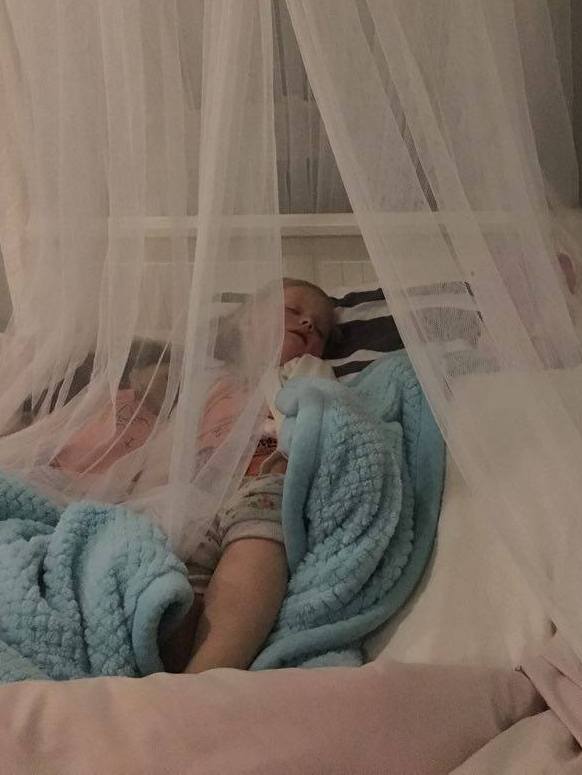With their high awareness, sensitivity, and fresh take on the world, young children tend to see differently than we adults. That can be easy for us to forget. For example, while we might be happy and excited about the arrival of our second baby, a move to a new home, taking a trip, or switching our toddler into his Big Boy Bed, children tend to feel the disruption and loss in these changes. And it shows in their behavior. Taking a moment to consider our children’s perspective can be the answer to responding effectively.
When Jackie shared the difficulty she was having helping her daughter sleep in their new home, I instantly related. Taking her three-year-old’s perspective came easily to me, perhaps because of all the years I’ve been working with young children and their families. But it might also be because (ahem) for reasons not entirely known to me, I still seem to be affected by an inner toddler of my own. Call it arrested development or whatever. And like most toddlers, the toddler in me does not readily embrace transitions and change.
Jackie’s situation brought back my own experience over a decade ago when my husband and I remodeled our home, which included adding several feet to the miniscule, cozy nook of a bedroom that I’d been accustomed to. For weeks I struggled to fall and stay asleep, because this room was not only novel, but comparatively cavernous and echoey. For me, it was like trying to fall asleep in a museum (which I also failed at for real as a Girl Scout leader at the annual Science Center Sleepover). It felt ridiculous to be complaining about such a blessing! Eventually, after many sleepless nights, I got used to it, but the process was not confidence-building.
Here’s the exchange I had with Jackie:
Hi Janet! My family recently moved into a new home and we’ve been working hard to be sensitive to our 3-1/2 year-old’s needs. The first week was great, but this second week has been rough — a lot of night waking and difficulty falling asleep for her. Tonight she asked to sleep in a crib and requested we get out her little brother’s Pack `n Play for her to sleep in. She is very articulate, and we had a whole conversation about it. She said, “I will get out of my bed again and again and not stay in my bed unless you give me the playpen.”
We talked about her new bed and how sometimes little girls feel scared or nervous in their new homes. She didn’t say she felt any of that, but we continued the acknowledgement that such feelings are okay and normal. We let her sleep in the playpen, but my husband feels uncomfortable letting that become a habit, mostly worried that she will have an accident because she can’t get out on her own and use the toilet.
Anyway, how do I respond to requests that seem ‘regressive’? Is she wanting more limits? Is she wanting reassurance that her normal bed is safe?
Hi Jackie! Did she have a crib in the old house? I think she’s asking for a cozy nest, which is very understandable in these new surroundings… If you are against using the playpen, you might consider how to make her bed feel more enclosed and nest-like.
Great to hear from you! Janet
Janet: She had been in a twin bed for over a year. We discussed why she likes the crib, and she said because it has sides, and we remembered we had bought a mesh canopy for the bed before the move. We put that up tonight and made a nest of pillows and the fluffiest blankie in the house, and she decided to give it a try. Went right to sleep!
To understand your child’s perspective:
Explore. Ask questions and acknowledge possible feelings like Jackie did, but don’t expect that will necessarily (or immediately) solve the problem. Children are often unable to understand what is bothering them, much less express it.
Listen to, but also observe your child. Often we have to read between the lines to see beyond what they are able to express explicitly.
Ask friends who share your parenting values about similar situations they may have experienced and what they learned from them.
Imagine. Channel your inner child.
♦
Thank you, Jackie, for allowing me to share your story and photo!
(Thumbnail by Donnie Ray Jones on Flickr)
I share more in Babies and Toddlers Dealing With Change – 3 Steps to Ease the Way and also in my compilation: Elevating Child Care: A Guide to Respectful Parenting
















This reminds me that my daughter used to always say we had to build her a nest to sleep in at that age. She’s double digits now and switched to a queen size bed. She said it felt huge and brought a bean bag chair to bed with her to make her feel more secure.
I love it! A girl after my own heart. Thanks for sharing, Lisa
Your “inner toddler…” LOVE that!I have one too, of course, but had never thought to name it. Thank you once again, Janet, for finding just the right words.
🙂 I love that you can relate! Makes me feel slightly less insane. Thanks, Ruth!
Hi, Janet. I really love your site, I read it often for guidance.
This is totally off topic but I don’t have Facebook to ask my question, so here it goes.
I was wondering if you (or maybe some readers) will talk about RIE in the context of a multilingual family. I always read in the blog a lot of examples of verbal communication between parent and child, which make really clear that the child clearly understand the parent (maybe they do not haveyet enough words to answer but at least they understand). It doesn’t to seem the case here. A lot of times you suggest “say this or that ” and I do it but it doesn’t seem to make any difference, he just doesn’t get it and I could have said something totally different instead and get the same result.
Of course it might be another problem, like that I’m not patient enough/ acknowledge his feelings in the right way / stick to the routine in a predictable manner/ be always consistent or something like that, but I really have the feeling that he doesn’t understand (we speak three languages in our home, he’s 18 months old ).
Any thoughts about that?
My children all slept in their cribs until they were around 4 years old. I think other people thought we were crazy but my children were happy and sleeping. And the cribs took up less space then beds.
Such a wonderful reminder to look at the world through their eyes. One of my goals this year is to become more mindful and present with my children. This is a lovely first step. Thank you!
Janet I have a (non-sleep related) question about when giving choices doesn’t work? My 2 yo son seems to be testing his level of power. ie. when I offer choices he will tell me “no, I don’t want either”, or simply “I’m not going to”. I have tried saying, OK I can choose, or you can choose…and then if he still resists the situation, OK I’ll choose then. But this doesn’t induce him to make the choice either. I sense that he’s trying out his need to be his own person, separate from me, and in this, not complying with anything I suggest.
Any advice gratefully received!
Oh, I should also add that I have always set boundaries with him, and carried out consequences. he is expert at calling my bluff (eg. if I say “which shoes do you want to wear” and the no-choice scenario plays out then he will go as far as saying “I don’t want to go to play group/farm/playground…I want to stay home!”)and remains quite happy with this is we follow thru’ with this consequence. But I don’t feel this is necessarily how we should be handling things – sometimes things are non-negotiable and I don’t think it is right for the balance of power to be with him But nor do I want to have an argumentative battle on my hands every time I give him direction – it’s exhausting!
This is about my granddaughter.
Do you have any advice on a 3 year old girl who has NEVER slept through a whole night? Maximum 5 hours, then awake for 2-3 hours playing, then finally back to sleep. This is the worst case scenario. Other times, she just wakes up, needs cuddles, climbs into bed with parents etc. They are exhausted as they also have a six month old, who sleeps much longer and better than the first one.
I love this conversation, Janet! I too wish I had this knowledge when my son was young and his new brother arrived! lol We eventually found a great indoor “tent” for his room that he loved to sleep in. But now there are great products available. I just saw this great product and thought this would have been perfect for my son! -Lynn http://bit.ly/20WEkmS
Hi Janet,
I’ve been following your blog and FB for quite a long time and trying to apply RIE as much as I can.
I am a stay at home mom who breastfed until my daughter’s 2nd birthday. When I finally weaned her (after giving her fair warning for about a month), my once easy going, happy child who fell asleep easily, turned into someone who screams bloody murder for naps! So around 5-6 pm she totally loses it and we are all miserable. We try to be gentle and understanding and never yell at or scold her. But that last hour before bedtime is just like hell!
I know this is a very big step for her and she must be feeling all kinds of things. My question is, is there anything else to do besides being patient, staying calm and praying for this phase to end as soon as possible.
Thanks for all your insight and sharing your experience with us…
Hi Janet!
This is helpful, and I can’t wait to test some of this out tonight! My son is not yet 2 and is not quite that articulate, but I’m hoping maybe adding some things that remind him of our bed (maybe he really hates his mattress), or making a nest like you suggest will be the way to help him feel more comfortable in his “big boy bed” (which is really just his crib converted, but still counts)!
Hi Bethany! I hope that works for him!